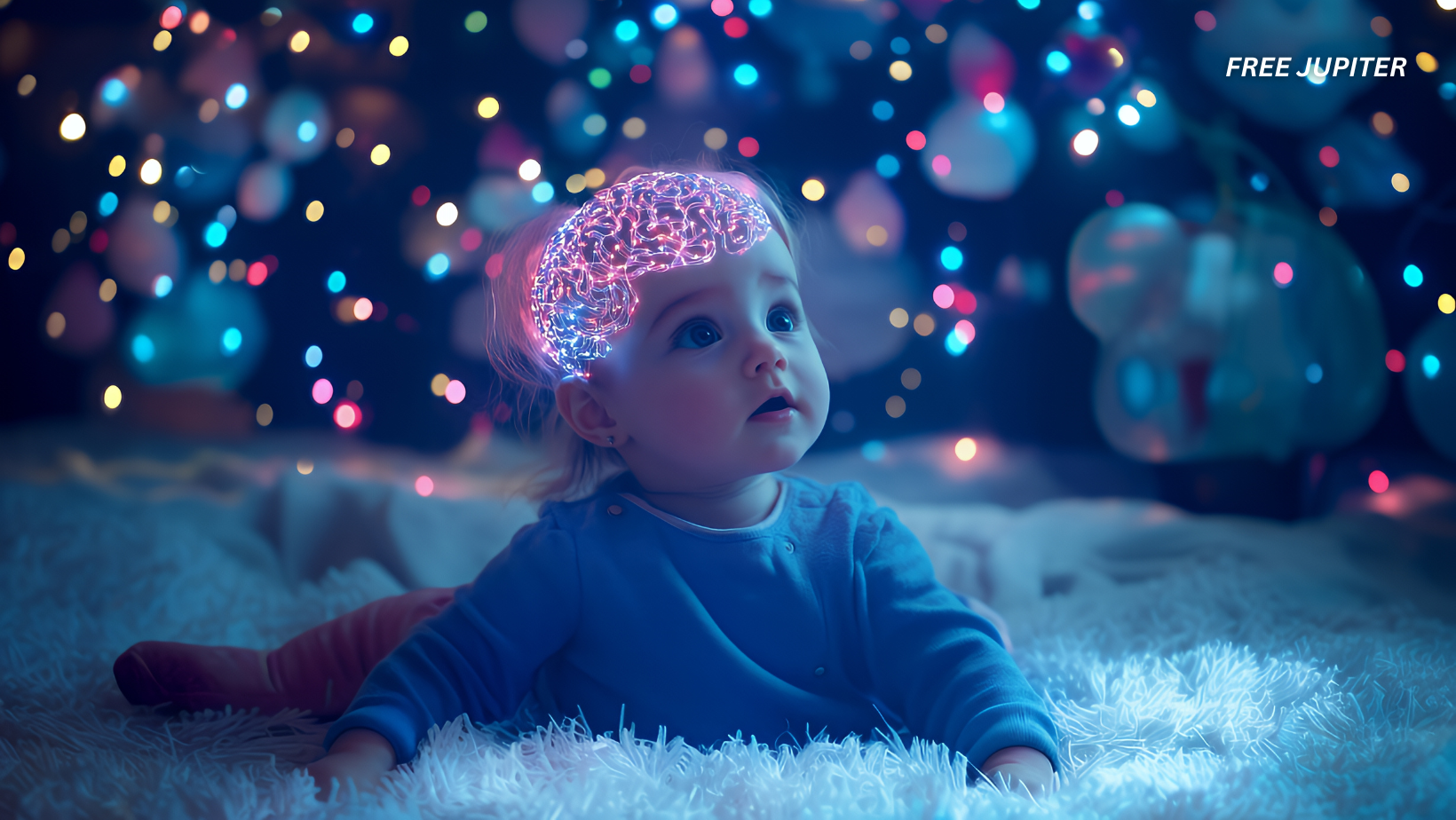Note: FreeJupiter.com shares general info for curious minds 🌟 Please fact-check all claims—and always check health matters with a professional 💙
Most people think of music as entertainment, a backdrop to daily life, or a way to calm restless babies. But new research suggests music is much more than a pleasant distraction for infants—especially for those who arrive in the world too soon. It might actually play a role in shaping their brains during one of the most sensitive windows of development.
Recent studies show that playing music to very premature babies in neonatal intensive care units (NICUs) can significantly support brain growth, particularly in areas tied to emotions and social understanding. This finding adds weight to a growing body of evidence that early exposure to structured sound has profound effects on the way young minds develop.
Why Preterm Infants Need Extra Support
Babies born ahead of schedule—sometimes weeks or even months before their due date—often face unique challenges. While modern medicine has made remarkable advances in keeping preterm infants alive, their brains are still in the process of wiring themselves during those crucial last weeks of pregnancy.
Inside the womb, the final trimester is a period of rapid brain growth. The neural circuits that handle emotions, sensory information, and social interaction are still under construction. When babies are born too soon, they miss out on the protected environment of the womb and instead spend their earliest days in the bright, noisy, and highly stimulating atmosphere of an intensive care unit.
This sudden shift can leave their developing brains vulnerable. Studies estimate that about 25% of preterm babies may later struggle with social or emotional difficulties, ranging from trouble managing feelings to challenges with forming relationships. Finding gentle, effective ways to support these babies while they’re still in the NICU has become a major focus for researchers and clinicians alike.
Read more: Scientists Find Certain Brain Layers That Actually Grow Stronger With Age
Music as a Brain Workout
It may sound surprising, but music is more than just a pleasant noise. On a neurological level, it’s a complex pattern of rhythm, pitch, and harmony that activates multiple brain areas at once. Listening to music has been shown in adults to engage networks tied to memory, attention, and emotion. For babies, whose brains are still wiring themselves together, those same patterns can provide much-needed stimulation.
The recent study revealed that music seemed to speed up the growth of brain regions like the orbitofrontal cortex, insula, and temporal pole. These names may sound technical, but what they boil down to are key hubs for processing feelings, making sense of social cues, and blending sensory experiences into a coherent picture of the world.
Think of it this way: when a baby hears a melody, their brain isn’t just “hearing.” It’s practicing how to link sound with emotion, attention, and memory—all skills that will later help them recognize a parent’s tone of voice, bond socially, and even learn language.
The Evidence: Stronger Connections, Stronger Futures
One of the most promising outcomes from this research was that babies exposed to music developed stronger connections between important brain networks. These networks included those linked to paying attention, processing emotions, and managing sensory input.
Months later, when the researchers compared these music-exposed preemies to babies born at full term, the differences were striking. The music group showed brain activity and emotional development that looked much more similar to babies who had never experienced premature birth.
In other words, music helped “close the gap” in early development.
For families and healthcare providers, this is big news. It suggests that something as simple and low-cost as carefully selected music could offer preterm babies a better start in life, especially when it comes to long-term emotional and social health.
Why Music Works So Well for Babies
There are several reasons why music might be especially effective for newborns:
- Rhythm mimics the womb – Inside the womb, babies are surrounded by rhythmic sounds, most notably the mother’s heartbeat. Gentle, repetitive musical rhythms may feel familiar and comforting, offering a sense of safety.
- Melody sparks attention – Babies are naturally drawn to patterns in sound. Melodic contours catch their attention and encourage them to focus, which strengthens their ability to process sensory input.
- Emotional resonance – Even without words, music carries emotion. A soothing lullaby can calm a distressed infant, while brighter tones may spark curiosity. These emotional cues help babies practice recognizing and responding to feelings.
- Whole-brain activation – Unlike some stimuli that activate only one area, music lights up multiple regions across both hemispheres of the brain. This makes it a powerful tool for strengthening connections across different networks.
Read more: The Science Behind Resilience: How the Brain Rewires After A Setback
Music in the NICU: More Than Just Background Noise
It’s important to note that the kind of music used in NICUs isn’t random. The goal isn’t to play the latest pop hits but rather carefully chosen sounds designed for fragile newborns.
Researchers and clinicians often use lullaby-like compositions with gentle rhythms, soft tones, and simple melodies. Some programs even incorporate recordings of a mother’s voice woven into music, blending familiarity with soothing sound.
These soundscapes are tailored to avoid overstimulation. Too much noise or complex sound can overwhelm preterm infants, whose nervous systems are still delicate. Instead, the music is delivered in measured doses, often during quiet, restful periods of the day.
A Low-Cost, High-Impact Intervention
One of the most exciting aspects of this discovery is how practical it is. Unlike high-tech medical equipment or expensive therapies, music is inexpensive, accessible, and non-invasive. It doesn’t require specialized machines or extensive training to introduce into NICUs.
For hospitals around the world—especially those with limited resources—this makes music an appealing option. It offers a way to support the most vulnerable newborns without adding significant strain to medical systems.
In the long run, even small improvements in emotional and social development can ripple outward, reducing the need for interventions later in life. Supporting babies at the very start may set the stage for healthier childhoods and stronger emotional well-being into adulthood.
Beyond Preemies: Could Music Benefit All Infants?
While this research focused on preterm babies, the findings raise an interesting question: could music also benefit full-term infants?
Many studies already suggest that music exposure helps babies develop language, improve memory, and strengthen parent-child bonding. Parents instinctively sing to their children, and cultures around the world have used lullabies for centuries. Science is now catching up to what human intuition has long known—music is woven deeply into the way humans connect and grow.
Future studies may explore whether structured music programs could become a standard part of early childcare, not just in hospitals but in homes and communities.
The Human Side of the Story
Beyond brain scans and data, there’s also a deeply human aspect to this discovery. For parents of preterm babies, the NICU can be an overwhelming place filled with stress, worry, and uncertainty. Knowing that something as simple as singing to their baby or playing gentle music could make a real difference brings comfort and hope.
It reminds us that healing and growth aren’t always driven by technology alone. Sometimes, the soft notes of a lullaby carry as much power as the most advanced machines in the room.
Read more: A Brain Chip Can Now Read Human Thoughts With 74% Accuracy
A Symphony for Growing Minds
The idea that music can strengthen the brains of the tiniest, most vulnerable humans is both scientifically fascinating and emotionally uplifting. It suggests that nurturing isn’t only about feeding and protecting the body—it’s also about stimulating the mind and emotions, even from the very beginning.
As researchers continue to explore the relationship between music and the developing brain, one thing is becoming clear: music isn’t just entertainment. For newborns—especially those who start life with challenges—it may be one of nature’s most powerful tools for growth.
Image: Freepik.
Disclaimer: The information in this article is for general informational purposes only and is not medical advice. We are not doctors, and this website is run as a family hobby project. Always consult a qualified healthcare professional before making decisions about your health. Please fact-check any claims and use this content as a starting point, not a substitute for professional guidance.










